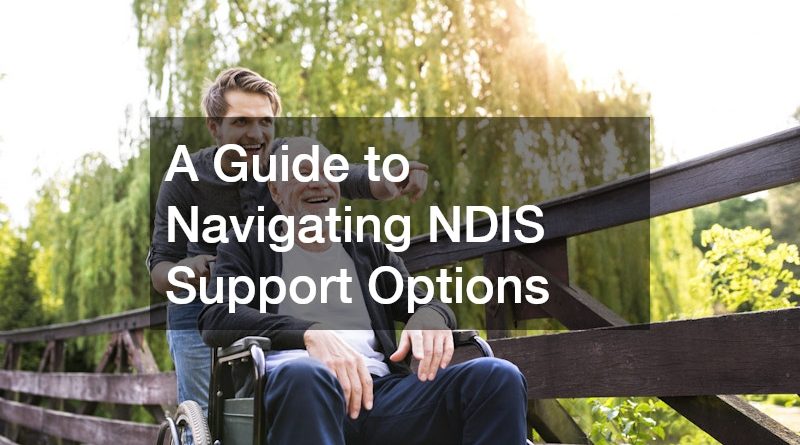A Guide to Navigating NDIS Support Options
Understanding how to access and utilise the National Disability Insurance Scheme (NDIS) can be overwhelming, particularly for those new to the system. The NDIS is designed to provide Australians living with a disability greater choice and control over their care and services. However, with numerous categories, plans and providers available, it’s essential to understand how to make the most of the available support. This guide aims to simplify the process, helping participants and their families to better navigate NDIS support options and ensure their needs are met with clarity and confidence.
Understanding the Structure of the NDIS
At its core, the NDIS provides funding to individuals based on their personal goals and functional capacity. This individualised approach means that every participant’s plan will be different.
The scheme is built around three key support budgets: Core Supports, Capital Supports and Capacity Building Supports. Core Supports address everyday needs like personal care or community access. Capital Supports assist with significant purchases such as assistive technology or home modifications. Capacity Building Supports aim to increase a person’s skills and independence, often funding services such as therapy or employment assistance.
Navigating these categories can be challenging without guidance. Some participants may initially struggle to differentiate between what is considered a necessary support and what might fall outside the scope of funding. That’s where effective plan management and coordination become crucial.
Choosing the Right Plan Management Approach
Once a participant is approved for the NDIS, they will need to decide how their plan will be managed. There are three main options: self-management, plan-managed and agency-managed. Each option has its benefits and limitations.
Self-management allows the participant or their carer to have full control over the funding. While this offers flexibility and choice, it also demands a high level of financial responsibility, including keeping receipts, processing payments and meeting NDIS compliance requirements. Plan-managed participants work with a registered plan manager who handles the financial aspects, including invoice payments and record keeping, while still allowing access to both registered and non-registered providers. Agency-managed plans are administered by the National Disability Insurance Agency (NDIA) and restrict service access to NDIS-registered providers only.
Selecting the right option depends on the individual’s circumstances, their ability to handle financial tasks and their preference for flexibility. Understanding the implications of each model helps participants make informed decisions that align with their lifestyle and capacity.
Finding & Working with Service Providers
Another critical aspect of navigating NDIS support is choosing suitable service providers. The marketplace includes a mix of large national organisations, smaller local businesses and independent support workers. Providers offer services such as occupational therapy, speech pathology, behaviour support, personal care and community participation.
The choice of provider can significantly affect a participant’s experience and outcomes. Participants should look for providers who align with their goals, communicate clearly and respect individual preferences. Reviews, recommendations and initial consultations can help determine if a provider is a good fit. It’s also important to remember that participants have the right to change providers if their current arrangements are not meeting expectations.
Maintaining open communication and clearly outlining service agreements can help avoid misunderstandings. These agreements should include expected service levels, rates, cancellation policies and timeframes. Establishing a professional yet supportive relationship with providers ensures consistency and reliability in service delivery.
Setting & Reviewing Your Plan Goals
Goal setting is a cornerstone of every NDIS plan. These goals form the basis for funding allocation and must reflect what the participant wants to achieve in both the short and long term. Goals can be broad, such as improving social connections or specific, like learning to travel independently. The clearer and more measurable the goals, the easier it becomes to identify suitable supports and evaluate progress.
It’s important for participants to prepare ahead of their planning meeting by reflecting on their needs and aspirations. Including support from family, carers or allied health professionals during these discussions can also strengthen the participant’s case.
Each year or during a plan review, participants have the chance to update their goals. This is a valuable opportunity to adapt to changes in health, circumstances or priorities. Reviewing outcomes regularly ensures that the participant remains on track and that the plan evolves in step with their development.
Making the Most of NDIS Support
NDIS support is more than just funding – it’s a pathway to independence, inclusion and quality of life. To make the most of it, participants must remain proactive and engaged. Understanding how to navigate the plan, selecting the right supports and setting achievable goals all contribute to a successful NDIS journey.
Participants should also stay informed about updates to the scheme, as changes to pricing arrangements, eligibility or plan structures can impact their current arrangements. Workshops, local area coordinators and NDIS partner organisations can all provide additional information and guidance.
Advocacy also plays a role in ensuring participants get the most from their plan. Whether it involves appealing a decision or seeking support to communicate needs effectively, external advocates can be instrumental in helping participants understand their rights and navigate complex processes.
Empowerment Through Understanding
While the NDIS can initially seem complex, with the right information and support, participants can confidently access services that enrich their lives. Whether it’s selecting providers, managing finances or setting meaningful goals, every decision should be guided by the participant’s unique circumstances and aspirations.
By taking the time to understand how NDIS support works and how to tailor it effectively, individuals and families can ensure that they are not just receiving assistance, but building a framework for lasting independence and fulfilment.
.

